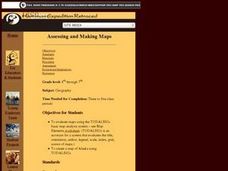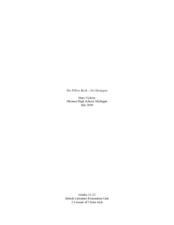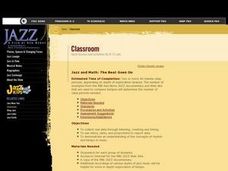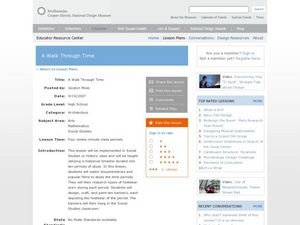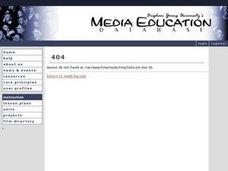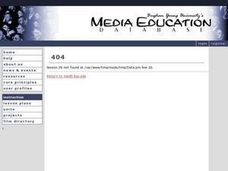NPR
Civil Rights of Japanese-American Internees
Prompted by a viewing of Emiko and Chizu Omori’s Rabbit in the Moon, a documentary about the internment of Japanese-Americans during World War II, high schoolers examine a series of documents, including the Bill of Rights and the UN’s...
Curated OER
Structure of Natural Narratives
Class pairs select a prompt from a provided list and tell (and record) their story to their partner. They then examine linguist William Labov's model for natural narratives, and apply his model to their tale. Next, class members watch...
Channel Islands Film
The Legendary King
After viewing two documentaries about the history of the Channel islands, individuals craft an essay in which they compare the lives of Juana Maria, the Lone Woman San Nicolar Island, to Lester Holt and his family featured in the...
Howard Hughes Medical Institute
Human Skin Color: Evidence for Selection
Skin color is controlled by at least six genes. Young scientists learn about skin colors through a documentary. They discuss the topics of pigment, natural selection, and vitamin D absorption. They apply their knowledge to higher order...
Channel Islands Film
Once Upon a Time (Saxipak’a): Lesson Plan 4
How did the environment and natural resources found on the Channel islands influence the culture of the Chumash? Archaeology meets technology in an activity designed for middle schoolers. After viewing West of The West's documentary Once...
Channel Islands Film
Island Rotation: Lesson Plan 1
How do scientists provide evidence to support the theories they put forth? What clues do they put together to create these theories? After watching West of the West's documentary Island Rotation class members engage in a series of...
College Board
Evaluating Sources: How Credible Are They?
How can learners evaluate research sources for authority, accuracy, and credibility? By completing readings, discussions, and graphic organizers, scholars learn how to properly evaluate sources to find credible information. Additionally,...
Curated OER
What Do We Learn From the Repartiation of Alaska Native Artifacts?
Students observe and evaluate evidence of Alaska Native cultural symbols and artifacts. They research historical data from a variety of primary resources, including the Harriman expedition journals, related web sites, oral accounts,...
Curated OER
How Has Transportation Changed Since the 1899 Harriman Alaska Expedition?
Students recognize modes of transportation. They research historical data from a variety of primary and secondary sources including the Harriman expedition journals, related web sites, and photographs from the expedition. Students...
Curated OER
Assessing and Making Maps
Students evaluate maps using the TODALSIGs basic map analysis system, explained on the worksheet. They create a map of Alaska using TODALSIGs. Students brainstorm the elements of maps.
Curated OER
Can We Be Both Conservationists and Consumers?
High schoolers explore their role as consumers and conservationists and what roles they play in today's economic climate. They explore resource allocation issues. Students analyze data and draw comparisons between historical and...
J. Paul Getty Trust
Picturing a Story: Photo Essay about a Community, Event or Issue
Picture this. Class members follow in the footsteps of W. Eugene Smith, Dorothea Lange, James Nachtwey, and Lewis Hine by creating their own photo essay about a local event or issue.
Indiana University
British Literature Restoration Unit: The Pillow Book – Sei Shonagon
First drafted in the year 996, The Pillow Book contains reflections of those met by a lady-in-waiting in the Japanese court. A brief summary, historical context, and discussion questions are provided on the first two pages. Then, two...
Curated OER
Exploring Heroism
Young scholars examine the concept of heroism in this lesson plan, through personal reflection, group activities and a thoughtful analysis of the documentary, HEROES OF GROUND ZERO. They explore their own understanding of what it means...
Curated OER
Hong Kong Symphony: Heaven, Earth, Mankind
Students complete a unit on the reunification of Hong Kong with China in 1997. They watch and discuss a documentary, write an essay about unification, conduct Internet research on three artists from the film, complete a data sheet, and...
Curated OER
Race, Culture, And Identity in Daughter From Danang (Part 1)
Students examine cultural identity. They watch the PBS documentary, 'Daughter From Danang,' answer discussion questions, and write an essay regarding the characters ethnicities and stereotypes portrayed in the film.
Curated OER
Jazz and Math: The Beat Goes On
Students collect real data through listening, counting and timing jazz pieces.They use ratios, rates, and proportions to report collected data and demonstrate an understanding of the concepts of rhythm and tempo in music.
Curated OER
A Walk Through Time
Students investigate the types of footwear worn during ten periods of history. In this secondary, art/math/social studies lesson, students view documentaries and popular films to study the time periods. Students research the...
Curated OER
All About Me
Students produce a slide show documentary designed to help them recognize their individuality, respect each other's differences, and discover what makes them unique. They examine the concept of digital portfolios. It is designed to...
Curated OER
Cultural Representation in "Spellbound" Part 1
High schoolers watch the film "Spellbound". They analyze concepts of how the media represents race. They discuss how the movie depicts race after the film.
Curated OER
Race, Culture, And Identity in Daughter From Danang (Part 2)
Students examine cultural identity. They watch and discuss the second half of the PBS documentary, 'Daughter From Danang,' and write an essay addressing ethnic and cultural identity and how a film would portray their own cultural identity.
Curated OER
Culture Representation in "Spellbound" Part 2
Students watch the film "Spellbound". They examine how the film represents race. They analzye contemporary media to examine how they represent race as well.
Curated OER
Ivanov Goes to Moscow
Young scholars complete a unit on the play, "Ivanov" by Chekhov. They read and analyze the play, write a short story, watch a film of the play, complete a data sheet, and conduct a debate.
Curated OER
Houdini
Students examine Houdini, and his legacy in the world of magice. Also, they explore documentary techniques that help tell a story. In addition, they perform a magic trick and discuss what goes into a magic act.











